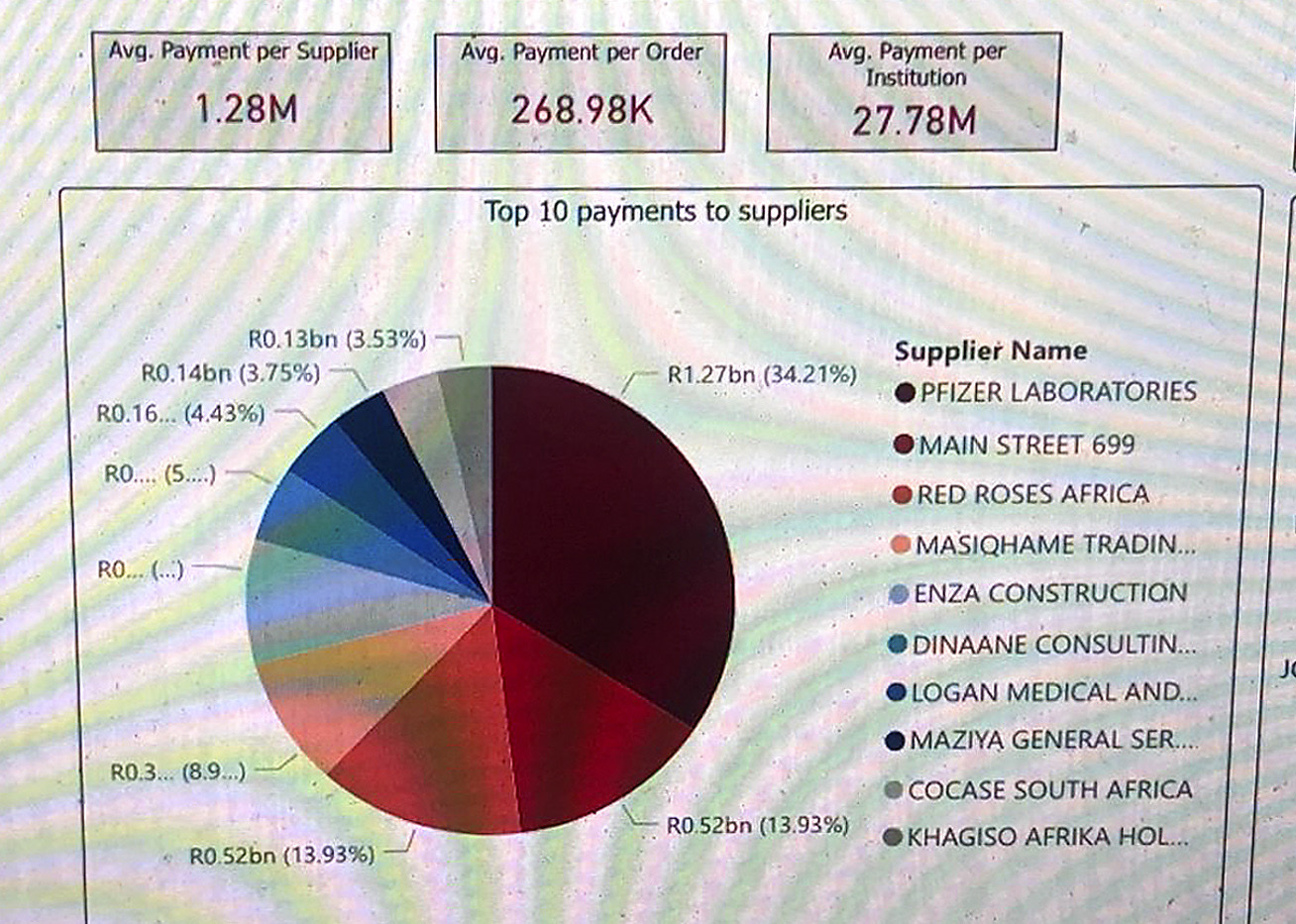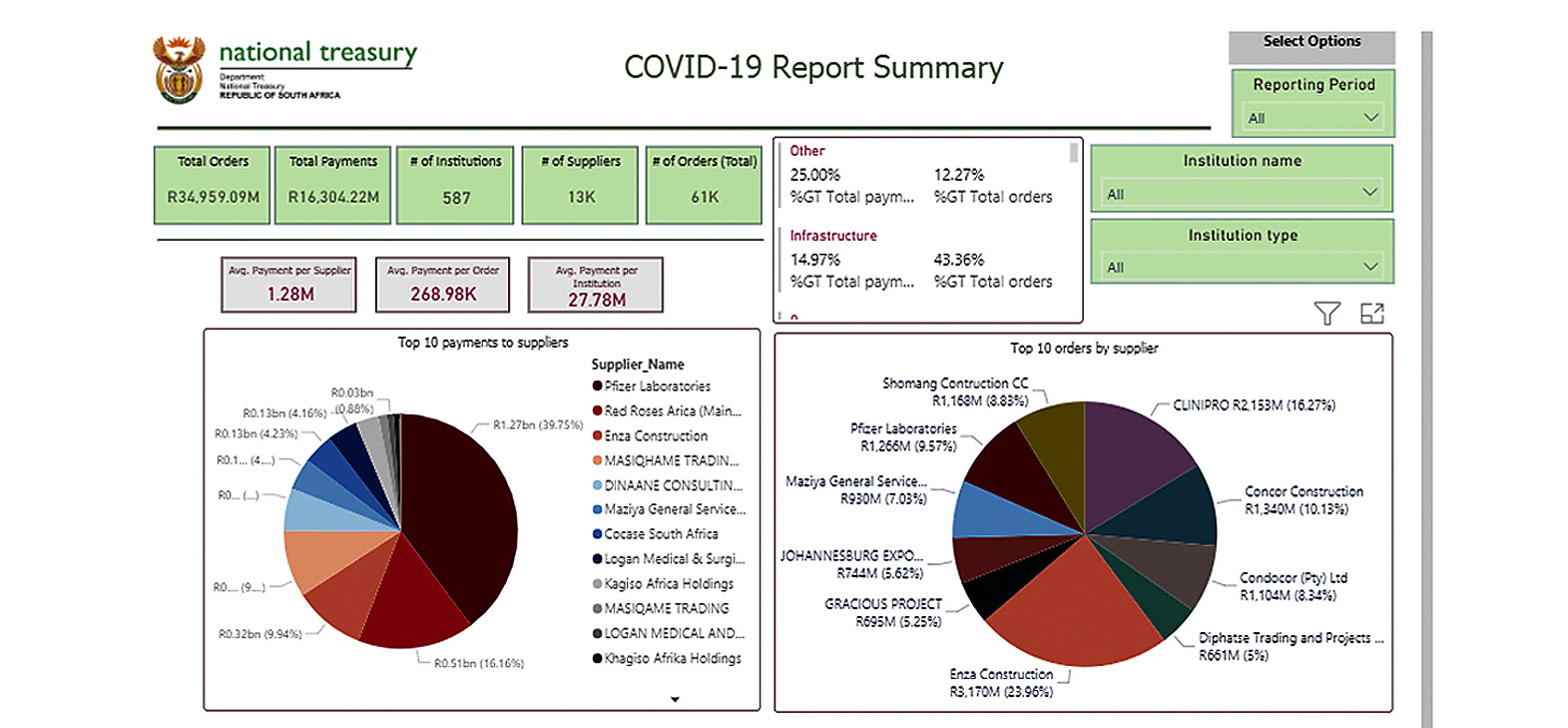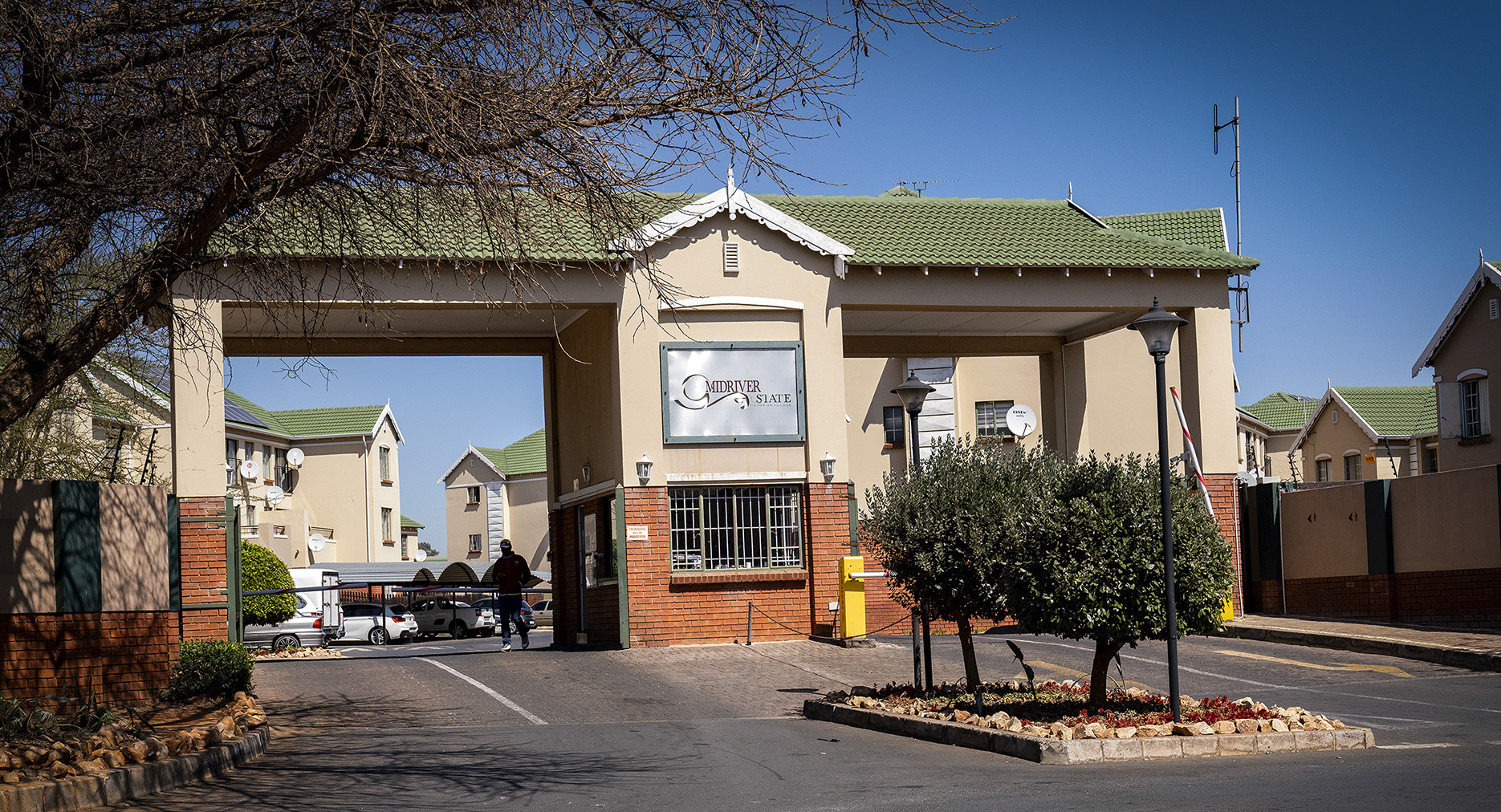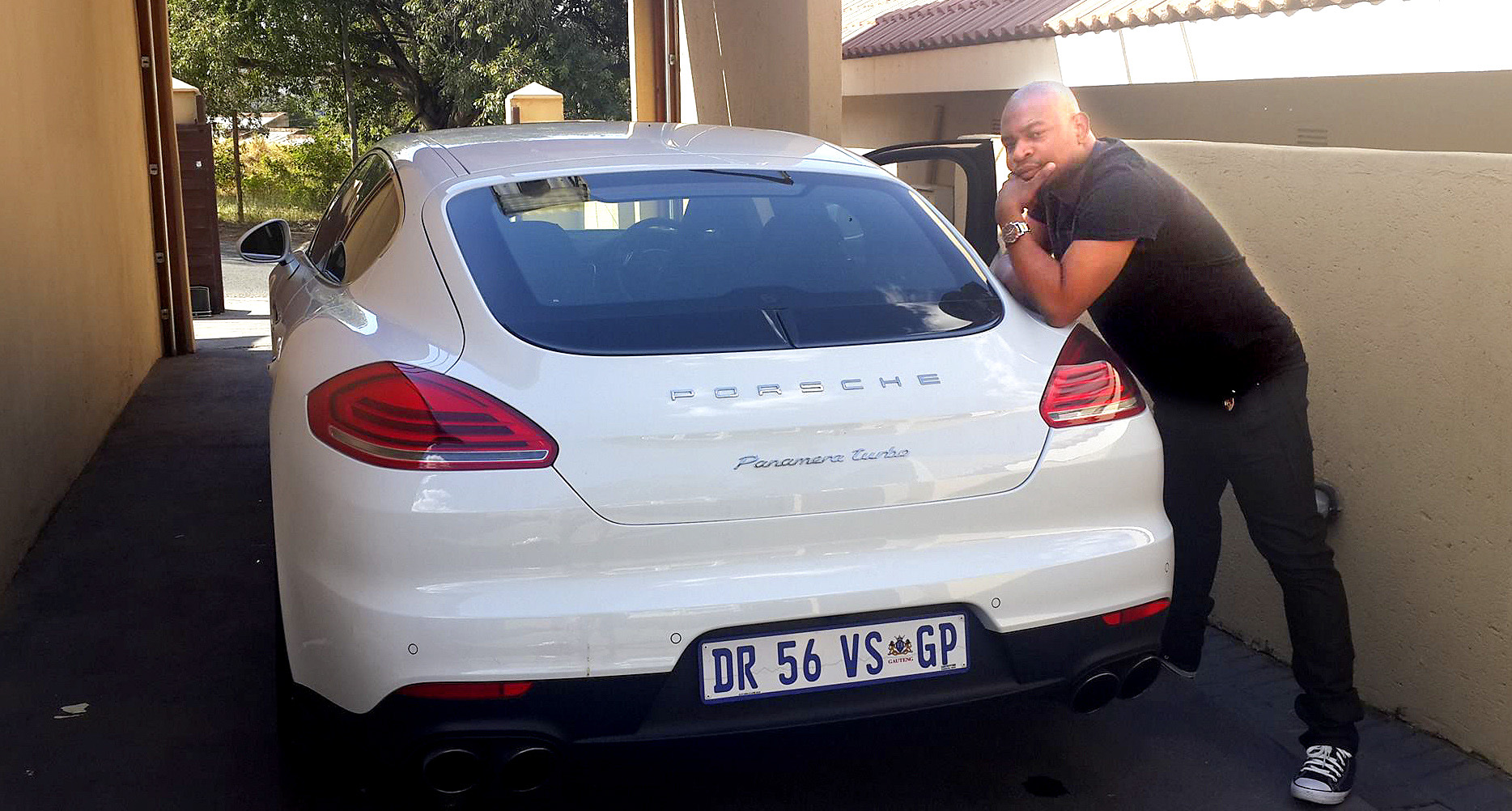MAVERICK CITIZEN INVESTIGATION
La Vie en Rose: A single Mpumalanga company robbed SAPS of hundreds of millions in Covid-19 PPE tender

Red Roses Africa (Pty) Ltd supplied the personal protective equipment at what is difficult not to describe as criminally inflated prices – R515m – and yet no one appears to be investigating.
A small, unknown company operating under two names, with a Barberton, Mpumalanga, business address, no traceable history of supplying personal protective equipment (PPE) products and a sole director (with an underwhelming online presence) scored contracts worth hundreds of millions of rands from the police at the height of the Covid-19 pandemic last year. Not only did it score the questionable contracts, it also managed to get R515-million paid for supplying masks and hand sanitiser and disinfectant at what is difficult not to describe as criminally inflated prices.
These and other details were revealed on the National Treasury’s dashboard on the government’s Covid-19 specific expenditure which records the companies that have benefitted from tenders and the amounts government departments paid them.
However, there has been some confusion as the Treasury published and republished altered information as Maverick Citizen sent persistent, and probing, questions pointing out anomalies. Until last Thursday, 16 September, according to the Treasury dashboard, the second- and third-largest payments for SA Police Service PPE were to two companies, Red Roses Africa (Pty) Ltd and Mainstreet 699. Each payment was for R515-million. It has since been established via various channels that Red Roses Africa and Mainstreet 699 are the same company.
These huge amounts and the continued confusion sparked an investigation by Maverick Citizen.
The Treasury’s media department told us that Red Roses Africa “has done business with the SAPS for Covid-19-related expenditure”, but would not answer questions about the nature of this business. Instead, they advised us to “contact the SAPS and the Supplier for more details”.
However, when we discovered no record of Mainstreet 699 on the Companies and Intellectual Property Commission (CIPC) database, we alerted the Treasury with a further set of questions. The Treasury ignored us, but then last Thursday, in an apparent attempt to re-engineer Treasury data, Mainstreet 699 suddenly disappeared without explanation from the list of top payments on the dashboard – even though the total amount paid to all companies – R16.304-billion – remained unaltered.

A screengrab from the Treasury website before it was altered, clearly showing Red Roses Africa and Mainstreet 699 receiving over half a billion Rand each.

A screengrab from the Treasury website after it was altered, clearly showing Mainstreet 699 had been removed
We sent the Treasury an email pointing this out and stating that “either you are hiding something or your records are inaccurate and have been inflated by R515-million”. Belatedly, on Sunday night the Treasury admitted its error, saying that, “The payments reflected in the COVID Dashboard made to Red Roses Africa (CSD Number – MAAA0318319), were also reflected as duplicate payments to Mainstreet 699 due to the fact that Mainstreet 699 was used as a ‘Trading as’ name for Red Roses Africa with the same CSD Number (MAAA0318319).”
(In the same email, the Treasury revealed that Mainstreet 699 – now using this name, not Red Roses – has received close to a million rands in payments from the Electoral Commission of South Africa as well, most of it for PPE and digital thermometers. There was no explanation as to why this company was trading under two names. Maverick Citizen will follow the Electoral Commission trail in subsequent investigations.)
Something smells deeply rotten.
Come out smelling of Red Roses (not)
This is what we discovered when we tried to find out how a company, one of many with no traceable history in the cleaning business and with an incongruous name like Red Roses Africa, scored the second-biggest payment in the whole Covid-19 disaster response.
Red Roses Africa is an unlisted company, registered on the CIPC database as having two active directors, Blessing Qwabe and an entity identified only as Sekretari. A search reveals that Sekretari is a business entity that can be appointed as company secretary. Qwabe’s LinkedIn profile says that he was previously an IT manager at the Guma Group.
(Guma Group is owned by Mpumalanga-born business mogul Robert Gumede who has won several multibillion-rand contracts with the government over the years.)
Red Roses was registered in 2007 and its sparse cut-and-paste website advertises its main business as “PPE, Chinese Tractors, Agricultural Implements, and ICT Products”.
Despite the massive amount paid to Red Roses for sanitisers and disinfectants, the company is not listed as a supplier of detergents with the National Contract Cleaners Association. Neither is it listed on the South African Health Products Regulatory Authority’s (Sahpra’s) database as an accredited supplier of PPE.
The CEO of Sahpra, Boitumelo Semete-Makokotlela, pointed out that regulatory requirements for PPE differ according to the intended uses of the product as well as its nature. At a minimum, as explained in an April 2020 Joint Communication to Industry issued by Sahpra, the SA Bureau of Standards and the National Regulator for Compulsory Specifications must approve a product.
We sent a series of questions to Red Roses Africa (Pty) Ltd asking it to verify the Treasury’s record of payments and whether it had a relationship with Mainstreet 699.
Qwabe, the managing director, confirmed that “Red Roses (formerly Mainstreet 699) was awarded a contract to supply Masks & Sanitizers to SAPS as part of the emergency procurement due process as approved by the National Treasury.
“We delivered all products within the stipulated 15 and 30 days, respectively, (April 2020) and were paid in full as reflected in the total amount as embodied in the AG report presented.”
From his points in parentheses, we got it from the horse’s mouth that Red Roses Africa and Mainstreet 699 are in fact the same company. What is unclear is why in June 2020 Mainstreet 699 was still trading under that name with the Electoral Commission of SA (IEC).
For a relatively unknown company, the combined payments from SAPS and the IEC of more than R600-million seem extraordinary. Further follow-up questions were sent to Qwabe but were not answered.
We also sent a photographer to addresses linked to Qwabe’s name on the CIPC website: one in Pretoria, one in Kempton Park and one in Barberton.

An image showing the front of the Midriver Estates in Kempton Park, Gauteng, another address linked to Red Roses Africa. (Photo: Shiraaz Mohamed)

The site in Lynwood Glen, Pretoria. Photo:Supplied
Qwabe, however, is not media-shy. He keeps a presence on LinkedIn, Instagram (with limits as to who can see it), Twitter and Facebook, and does not seem coy about his wealth, boasting of Porsche cars and flashing expensive watches on his Facebook page.

Blessing Qwabe. (Photo: Facebook)

Blessing Qwabe, not shy to show off his Porsche and Montblanc timepiece. Photo: Facebook
Cover-up, what cover-up?
But the rot is deep.
In the September 2020 draft internal audit report, Red Roses Africa was not listed as one of the beneficiary companies – although Mainstreet 699 (Pty) Ltd was – for an order of R596-million. Yet, today it is listed by the National Treasury on its public dashboard of Covid-19 expenditure as the largest recipient of the SAPS’s massive PPE purchases.
When and why did Mainstreet 699 become Red Roses Africa in the SAPS book?
In response to specific questions about this, once again, SAPS spokesperson Brigadier Vish Naidoo chose silence.
With regard to Red Roses Africa, Naidoo responded that, “The SAPS, like all other Government Departments, have been providing detailed information on the procurement of PPEs to the Fusion Centre, which the President established. Therefore, I suggest you direct your questions there.”
We also asked the Treasury whether it had investigated this contract or referred it to the Fusion Centre. Their vague response: “The matter has been investigated by other law enforcement agencies, i.e SIU [Special Investigating Unit].”
But has it? We tried to find out.
Questions sent to the head of the Hawks, Lieutenant-General Godfrey Lebeya, who chairs the Fusion Centre, the body that coordinates the different government agencies investigating Covid-19 corruption, were not answered.
In response to questions as to whether the SIU is or has in the past investigated any contracts with the SAPS, Kaizer Kganyago, spokesperson for the SIU, said that after “checking and rechecking…. We do not have any allegations from the police at the moment that we are investigating.”
This is borne out by a comprehensive update on “State Institutions Investigations” made by the SIU to Parliament’s Standing Committee on Public Accounts on 1 September: in 118 slides the SAPS was not mentioned once.
Finally, given Qwabe’s reference to the “AG’s report” we went through the three special Covid-19 expenditure reports published by the Auditor-General (in September 2020 here, December 2020 here and June 2021 here). Although the first two reports of the AG-SA carefully audited spending on PPE by the departments of Health and Education, the AG-SA does not appear to have audited the SAPS.
We also asked Qwabe to send us the “AG’s report” he had referred to, but he failed to do so.
These AG omissions seem inexplicable.
Tumelo Mogodiseng, the General Secretary of the South African Policing Union (Sapu), said that at the beginning of the pandemic “we were concerned about the lives of our members, not about price”. However, the union had not been made aware of any charges being laid against its members regarding fraud or overpricing of PPE equipment. He said that “Sapu condemns corruption and if there are people who have benefited at the expense of the taxpayer, they must face the law.”
Asked about whether Sapu’s membership included senior police officials, Mogodiseng said it did, but that “crime doesn’t have a rank. In fact, if you are a general, the punishment should be harsher.”
PPE corruption – aloota granda continua
PPE corruption, synonymous with the departments of Health and Basic Education, has been extensively investigated by the media and the SIU. Unfortunately though, the rot appears to have infected the very people who should be protecting us against corruption – the SAPS.
The Treasury dashboard which breaks down the payments made to Red Roses Africa and several other companies reveals an unprecedented level of price gouging on the products they sold to the SAPS:
The SAPS PPE splurge at a glance:
- The SAPS has spent R1.56-billion on PPE, sanitiser, disinfectants and other items. More than half (56%) of this expenditure was on surgical masks, 32% on hand sanitisers and disinfectants and the remaining 12% on goggles, surgical gloves, thermometers, fogging of buildings etc.
- The SAPS sourced 90,000 25-litre containers of hand sanitisers and disinfectants from Red Roses Africa, which charged R5,405 per 25-litre unit. This resulted in a payment of R486-million to Red Roses Africa. According to a source from the National Contract Cleaners Association, “The list price on a top of the range twin-chain QAC (quaternary ammonium compound) disinfectant detergent with NRCS registration is R810 plus VAT per 20L container. The price to major users is R700.” Red Roses has apparently made an enormous profit at the moment where every cent was necessary to fight the pandemic.
- Between March and May 2020, the SAPS procured 43,559,996 masks – enough to give a mask to 72% of South Africa’s population. Two million of these were from Red Roses Africa at a price of R14 per mask, coming to more than R28-million.
- Prices for masks varied, with the lowest service provider charging R9.50 per mask and the highest service provider charging R155 per mask. In total, R878.5-million was spent on procuring masks.
- Two suppliers, Zambiyise and Zwanake Marketing, charged R220 and R350, respectively, for one pair of non-surgical gloves. Other suppliers charged between R1.91 and R3.46 per pair.
- R49-million was spent on “wipes containers” and R6.2-million on “goggles”.
(All these figures are sourced from information stored in the Treasury dashboard with assistance from Corruption Watch campaigns manager and data scientist Kavisha Pillay.)
SAPS internal audit finds massive irregularities
In October 2020, the first allegations about possible corruption in the SAPS around PPE procurement surfaced in the Sunday Independent, based on a leaked draft report titled “Risk Based and Compliance Review, Division, Supply Chain Management Covid-19 Procurement of PPE”.
The report claimed that hundreds of millions of rands had been wasted through the purchase of overpriced PPE due to irregular procurement procedures. One of the draft audit’s findings was that:
“There was a material deviation from the price list approved by National Treasury as some of the suppliers charged more than the ceiling price. The difference in prices resulted in a material loss of R354,698,420.”
The report’s author was the SAPS’s chief audit executive, Major-General DT Nkosi, and he recommended numerous times in his report that the findings be investigated.
At the time, SAPS spokesperson Brigadier Naidoo refused to comment.
In January this year, Daily Maverick reported that “the SAPS had spent about R1.4-billion on PPE as at mid-July 2020”. Our report named several of the companies implicated and said, at that time, to be under investigation by the Hawks and the SIU for procurement fraud.
SAPS PPE scandal: Clash of top brass amid claims of massive corruption
Several senior police officers – Lieutenant-General Francinah Vuma (Divisional Commissioner: Financial Management and Administration), Major-General Johannes Riet (acting and later Divisional Commissioner: Supply Chain of the SAPS) and Crime Intelligence head Peter Jacobs – were named as being implicated in the dodgy procurements.
However, since then, the recommended or reported investigations seem to either have gone cold or perhaps never have started.
This is despite the fact that what appears to be a final internal audit report of “consolidated critical audit findings” for the 2020/21 financial year, which we believe was presented to the Parliamentary Portfolio Committee on Police in December 2020, confirmed the findings that appeared in the September 2020 draft report.
Among its findings, it noted:
- Irregular expenditure incurred as a result of procurement process not being adhered to, and:
- Non-compliance to Treasury regulations; 34 orders for procurement of PPE to the value of R1.62-billion were concluded on verbal authorisation.
Worryingly, in its comment on supply chain management, the report states that:
“It will be difficult or impossible to verify the validity and accuracy of payments made if the procurement file and relevant supporting documentation is not made available for audit purposes.”
This suggests information may be being withheld from the SAPS’s internal auditors.
Finally, in an understatement of the year, the SAPS audit report concludes that the impact of this frenzy of irregularity is “undermining sound corporate governance initiatives put by the department”.
Covid-19 disinfection protocols and procedures in the SAPS
According to Corruption Watch’s Veza app for reporting police misconduct, there are 1,150 police stations in SA.
To try to understand whether the R1-billion+ expenditure on PPE could possibly be justified, we also asked Naidoo to explain the approach by the SAPS to sanitising and decontaminating police stations.
Naidoo responded that the SAPS “has a protocol on decontamination of buildings and other workspaces where a positive case is detected. Internal resources are used to decontaminate affected buildings, i.e. Forensics Services Explosive Unit, as they have all the instruments to do the decontamination. Above this, our cleaners are trained on the deep cleaning processes and SAPS employees are trained to sanitise all work spaces and surfaces daily before and after duties.
“This is done throughout the 9 provinces and Head office, as there are steering committee meetings held on a weekly basis to report on Covid-19 issues in each province. All guidelines are developed by [the] National steering committee for Covid-19 and disseminated to all nine provinces and divisions. So a uniform process is followed by all members.”
He added that: “WHO/CDC, DOH and DOEL guidelines pertaining to COVID-19 have been used to craft the organisations’ protocols and all these are signed by the National Commissioner.”
Maverick Citizen requested the protocol but it was not provided.
Based on the evidence available to us so far, we can only conclude that:
- There have been massive tender irregularities in the awarding of PPE equipment in the SAPS;
- These irregularities were detected and reported as early as September 2020;
- There has been no action on the findings; in fact, they seem to have been made to go away; and
- In an inexplicable further omission, neither the Treasury, the SIU, the Hawks or the Auditor-General appear to be investigating these contracts. DM/MC
"Information pertaining to Covid-19, vaccines, how to control the spread of the virus and potential treatments is ever-changing. Under the South African Disaster Management Act Regulation 11(5)(c) it is prohibited to publish information through any medium with the intention to deceive people on government measures to address COVID-19. We are therefore disabling the comment section on this article in order to protect both the commenting member and ourselves from potential liability. Should you have additional information that you think we should know, please email [email protected]"




















 Become an Insider
Become an Insider